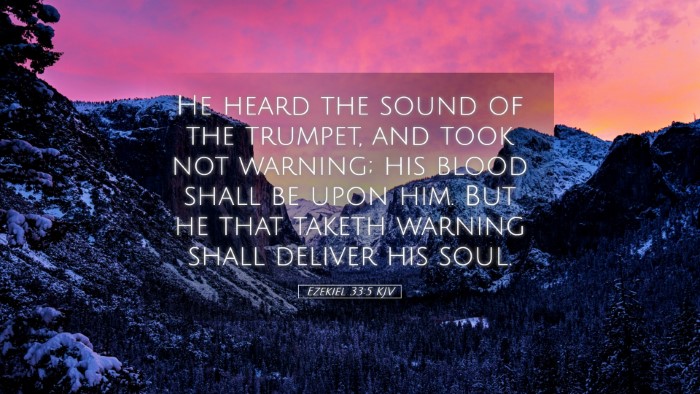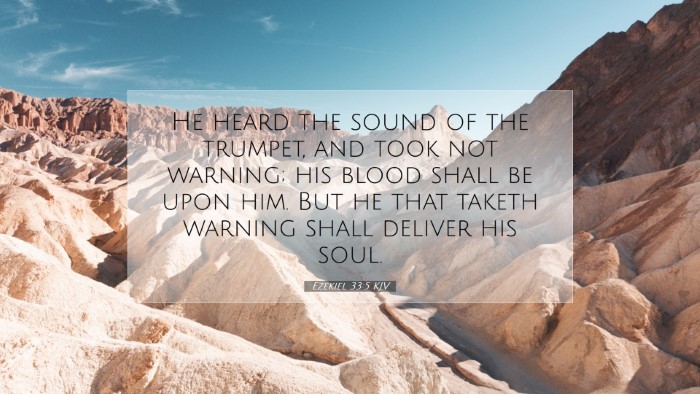Bible Commentary on Ezekiel 33:5
Ezekiel 33:5 (NKJV): "He heard the sound of the trumpet, but he did not take warning; his blood shall be upon himself. But he who takes warning will save his life."
Introduction
The verse under consideration, Ezekiel 33:5, encapsulates profound themes of personal responsibility, divine justice, and the critical nature of heeding God's warnings. This commentary synthesizes insights from notable public domain resources, offering a multifaceted exploration of this verse's implications for modern readers, particularly pastors, students, theologians, and scholars.
Contextual Overview
This verse is situated within a larger prophetic discourse where God commissions Ezekiel as a watchman for Israel. The call for vigilance comes as a dire warning to the people regarding their impending judgment. The sound of the trumpet symbolizes the announcement of danger, and the subsequent response of the people reflects their spiritual condition and accountability.
1. The Role of the Watchman
Matthew Henry emphasizes that Ezekiel’s role as a watchman underscores the responsibility of leaders to convey God’s warnings. The watchman is tasked with sounding the alarm regarding spiritual peril. When the trumpet sounds, it is not merely a call to attention but an urgent plea to act.
2. Personal Responsibility
Albert Barnes articulates that personal accountability is a central theme in this verse. The phrase “his blood shall be upon himself” denotes that individuals are responsible for their own actions. If the warning is ignored, the consequences are borne solely by the one who fails to respond.
3. The Consequence of Neglect
According to Adam Clarke, the neglect of the warning signifies a rejection of God’s grace. The refusal to heed such calls leads to dire spiritual consequences, thereby reinforcing the notion that neglecting divine counsel is an act of personal folly and rebellion.
Theological Implications
This verse provides valuable insights into several theological domains, including soteriology (the study of salvation), eschatology (the study of end times), and ecclesiology (the study of the church).
1. Soteriology and Personal Salvation
The emphasis on personal response to warning suggests that salvation is not merely an act of divine grace but also an engagement of human will. Pastors can derive from this the necessity of preaching messages that call for personal conviction and movement towards God.
2. Implications for the Church
The concept of the church as a watchman for its community comes to the forefront in this passage. Matthew Henry notes that the church must be vigilant in proclaiming the gospel's saving message while alerting members to the dangers of sin and complacency.
3. Judgment and Divine Justice
Albert Barnes asserts that this text reminds us of the doctrine of divine justice. God is depicted as fair in the administration of His justice—those who heed warnings are saved, while those who dismiss them face inevitable consequences.
Practical Application
For pastors and church leaders, this passage serves as a compelling call to action:
- Proclamation of Warnings: Pastors are encouraged to proclaim God’s warnings clearly and passionately, focusing on both the blessings of obedience and the consequences of sin.
- Encouraging Individual Responsibility: It is crucial to instill a sense of personal responsibility in congregants regarding their spiritual health and decisions.
- Creating a Culture of Vigilance: Churches should cultivate an environment that promotes discernment and accountability among members.
Conclusion
Ezekiel 33:5 stands as a timeless reminder of the human condition in relation to divine warning and response. Its significance transcends time and culture, calling every believer to remain vigilant, take responsibility for their spiritual well-being, and heed the trumpet's call. In teaching and leading, the concepts from this passage should empower today’s churches to embody the prophetic call effectively.


